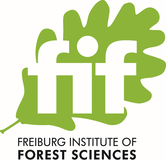FIF

Institute of Forest Sciences
 Forests provide a wide range of ecosystem services for our society: Wood and other forest products such as mushrooms and berries, the protection of climate, soil and drinking water, as well as cultural and social ecosystem services such as recreation and health. The protection of biodiversity as the basis for the fulfillment of ecosystem functions plays a prominent role. The Institute of Forest Sciences covers all types of analyses and management of forest ecosystems and deals with the relationship between society and forests. It can look back on a one hundred-year-old tradition of forest sciences at the University of Freiburg and combines ecological, natural, technical, economic and social science disciplines to answer the complex questions concerning the sustainable provision and use of these ecosystem services of forests.
Forests provide a wide range of ecosystem services for our society: Wood and other forest products such as mushrooms and berries, the protection of climate, soil and drinking water, as well as cultural and social ecosystem services such as recreation and health. The protection of biodiversity as the basis for the fulfillment of ecosystem functions plays a prominent role. The Institute of Forest Sciences covers all types of analyses and management of forest ecosystems and deals with the relationship between society and forests. It can look back on a one hundred-year-old tradition of forest sciences at the University of Freiburg and combines ecological, natural, technical, economic and social science disciplines to answer the complex questions concerning the sustainable provision and use of these ecosystem services of forests.
Research
The research activities of the professorships within the Institute of Forest Sciences have a clear focus on the forest, its protection and sustainable use. The forests of the future as well as their management and anthropogenic impacts are the focus of many research activities, often using inter- and transdisciplinary approaches. For example, the "ConFoBi" research training group funded by the German Research Foundation (DFG) focuses on the protection of biodiversity in the multifunctionally managed forests of Central Europe. The scientific research of the institute ranges from short-term physiological processes at the level of cells and organs, to interactions among plants, animals and microorganisms, and to long-term and large-scale processes at the level of ecosystems and landscapes. Close national and international networking and cooperation are the prerequisites for us to answer these research questions. We maintain a particularly close cooperation in research and teaching with the Forest Research Institute of Baden-Württemberg.
Teaching
The Institute of Forest Sciences carries mainly the BSc program "Waldwissenschaften" as well as the MSc program "Forstwissenschaften / Forest Sciences". In addition, the Institute's lecturers make significant contributions to all other study programmes of the faculty. In these programs, we train specialists who are able to analyze forest ecosystems and the social contexts in which forests are embedded, develop solutions for the protection and sustainable management of forests, and ultimately plan and implement them. Forestry education in Freiburg is characterized by a great deal of practical experience in the form of exercises and excursions as well as close cooperation with practitioners. The Black Forest, our open-air laboratory, is right on our doorstep. Furthermore, our study programs, especially at MSc level, are characterized by intensive cooperation and attractive exchange programs with international universities. The "Graduate School Environment, Society and Global Change (ESGC)" offers our doctoral students opportunities to learn additional skills, networking and cooperation.
Further Information
More information on teaching and research priorities of the individual chair groups and their staff can be found on the following websites:
- Applied Vegetation Ecology (Prof. Dr. Markus Hauck)
- Forest- and Environmental Policy (Prof. Dr. Daniela Kleinschmit)
- Forest Genetics (Prof. Dr. Katrin Heer)
- Forest Growth and Dendroecology (Prof. Dr. Thomas Seifert)
- Forest and Forestry History (Prof. Dr. Uwe E. Schmidt)
- Forest Operations (Prof. Dr. Thomas Purfürst)
- Forest Entomology and Protection (Prof. Dr. Peter Biedermann)
- Forestry Economics and Forest Planning (Prof. Dr. Marc Hanewinkel)
- Pathology of Trees (JProf. Dr. Kathrin Blumenstein)
- Remote Sensing and Landscape Information Systems (Prof. Dr. Barbara Koch)
- Silviculture (Prof. Dr. Jürgen Bauhus)
- Soil Ecology (Prof. Dr. Friederike Lang)
- Wildlife Ecology and Management (Prof. Dr. Ilse Storch)
Associated chair groups:
- Biometry and Environmental System Analysis (Prof. Dr. Carsten F. Dormann)
- Ecosystem Physiology (Prof. Dr. Christiane Werner)
- Environmental Governance (Prof. Dr. Heiner Schanz)
- Environmental Meteorology (Prof. Dr. Andreas Christen)
- Forest Biomaterials (Prof. Dr. Marie-Pierre Laborie)

